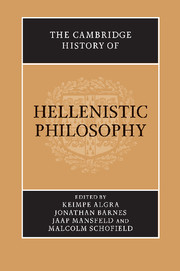Book contents
- Frontmatter
- PART I INTRODUCTION
- PART II LOGIC AND LANGUAGE
- PART III EPISTEMOLOGY
- PART IV PHYSICS AND METAPHYSICS
- 11 Hellenistic physics and metaphysics
- 12 Cosmology
- 13 Theology
- 14 Explanation and causation
- 15 Determinism and indeterminism
- 16 Epicurean psychology
- 17 Stoic psychology
- 18 Philosophy, science and medicine
- PART V ETHICS AND POLITICS
- Synopsis of principal events
- Editions of sources and fragments
- List of abbreviations
- Bibliography
- Index locorum
- General Index
- References
14 - Explanation and causation
from PART IV - PHYSICS AND METAPHYSICS
Published online by Cambridge University Press: 28 March 2008
- Frontmatter
- PART I INTRODUCTION
- PART II LOGIC AND LANGUAGE
- PART III EPISTEMOLOGY
- PART IV PHYSICS AND METAPHYSICS
- 11 Hellenistic physics and metaphysics
- 12 Cosmology
- 13 Theology
- 14 Explanation and causation
- 15 Determinism and indeterminism
- 16 Epicurean psychology
- 17 Stoic psychology
- 18 Philosophy, science and medicine
- PART V ETHICS AND POLITICS
- Synopsis of principal events
- Editions of sources and fragments
- List of abbreviations
- Bibliography
- Index locorum
- General Index
- References
Summary
Background
Our principal topic will be the views of the Stoics and Epicureans, and the various sceptical attempts to undermine their pretensions to explanatory understanding. Much of this is the history of polemic and dispute; but we may at the outset identify certain points of contact shared by all or most of the adversaries.
Most importantly, the Hellenistic causal theorists were materialists. And whatever materialism may be taken to amount to, most of them agree that causing is essentially corporeal: causal power is transmitted by bodily contact. Sextus notes that ‘some [sc. of the Dogmatists] say that body is what can act and be acted upon’ (S.E. PH III. 38; cf. M IX. 366), thus defining corporeality in terms of causal efficacy. Congruently, the Hellenistic period sees the emergence of the notion that, properly so called, a cause is something active. Plato had defined aition (‘cause’) quite generally as ‘that because of which (δι' ο) something comes to be’ (Crat. 413a); and Aristotle's four ‘causes’ (aitia: Phys. II. 3) include the material from which something is made, its structure, and its purpose, as well as whatever it is which made it. By contrast, for Seneca a cause is id quod facit, ‘that which actually does or produces something’ (Ep. 65.4); he objects to the ‘crowd of causes’ associated with the Platonists and the Peripatetics; design, purpose, and goal drop out of the causal vocabulary. Not that they disappear altogether; but for something to be a cause, an aition, now implies more than merely that it is an irreducible feature of a complete account or explanation of something, as it was for Aristotle.
- Type
- Chapter
- Information
- The Cambridge History of Hellenistic Philosophy , pp. 479 - 512Publisher: Cambridge University PressPrint publication year: 1999
References
- 8
- Cited by



